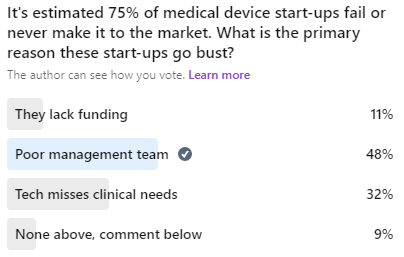|
What does it really take?
Today's episode of Medtech Snapshot features our managing director Travis N. Smith as he covers the outcome of an online survey we hosted to learn what people thought 'is the most important characteristic a medical device start-up management team needs in order to successfully take a product to market'. So, the question remains - what does it really take for a management team to bring their product to market? Listen in and find out! If you're enjoying our Medtech Snapshot 3-minute digests be sure to check out our other episodes at https://www.sqr1services.com/white-papers/category/snapshot #medtech #snapshot #medicaldevice #startup #commercialization #product #marketplace #square1engineering #management
0 Comments
In this episode we cover Medical Device Management Top Grading tips with Peter Nalbach, VP & GM, in Orange County, CA. Listen in as Pete outlines his 3-step process to align and bring in the right people to help move the company forward while simultaneously overcoming product challenges throughout the lifecycle process.
#management #medtech #medicaldevice #people #topgrading #leadership #snapshot Investing to Get Ahead at Work11/18/2022 Square-1's managing director Travis Smith is co-host of The Business Wingmen Show, a podcast covering business behaviors, strategies, leadership and much more. This week's episode...
EPISODE 89: Investing to Get Ahead at Work Making advancements in your career or your business means investing in yourself and the people with potential. But, how do you know it will pay off? Listen in as your Business Wingmen podcast co-hosts, Steve Smith & Travis Smith dissect why investing to get ahead at work makes sense, and just as important doing so proactively can change the game! Listen in to episode 89 here: https://www.spreaker.com/user/businesswingmen/089-investing-to-get-ahead-at-work?utm_campaign=episode-title&utm_medium=app&utm_source=widget Our LinkedIn poll concluded with some interesting findings and a fair amount of debate. It's estimated 75% of medical device start-ups fail or never make it to the market. Understanding the primary factors which drive these outcomes makes or breaks the difference in a start-ups success. As our respondents weighed in it was clear the primary factor which gets in the way of a start-up meeting up with success is in fact its own people. 48% of voters identified this as the primary reason for failure, many of which current have or have had in the past direct experience operating in a management role within start-ups. The debate ragged on within the poll as some people felt like the product (ie technology) played a larger part in the failure of the company as it's ability to meet a core, and perhaps large, clinical need drove a variety of things including funding, market acceptance, etc. In the end the old saying still rings true - the people we surround ourselves with makes all the difference. Are you an effective leader? If you answered ‘Yes’, how did you come to that conclusion? Did you base your answer off your company financial performance, goal achievement track record or your wonderful employee morale? What if Peter Drucker himself had an opportunity to review your leadership work, do you think he would come to the same conclusion? If by chance you are new to the philosophies and teachings of Peter Drucker I highly suggest taking some time to familiarize yourself with his works. Short and sweet – Drucker is considered the godfather of business leadership and is responsible for much of what we know today on how effective leaders work and operate. His works redefined leadership through the 60s, 70s and 80s and we still refer to his teaching on the daily today. What makes for an effective leader? Let’s ask Drucker himself. ‘The Effective Executive’, a leadership book for the times and originally published in 1967, provides eye opening insight on exceptional leadership in ways which broke the mold back then and continue to do so today. ‘The Effective Executive’ provides a straight forward, simplistic guide to “getting the right things done” for people in a leadership capacity. What I found amazing about this book is how relevant and simplistic Drucker’s advice is, even for today’s purposes 52 years later in a business world that is far different from when these thoughts were put to paper. So, what is it then that makes for an effective leader? All too often I find people enjoy making the topic of leadership how-to’s overly complicated. Maybe they do that to sell more books or to justify their new and insightful leadership methodology. For me, I’ve found the more simplistic something is the better chance I have in understanding it, implementing it and continuing to act on it as a new habit. Drucker’s approach to leadership success and effectiveness is simplicity at its best. He identifies the following five core competencies successful leaders should have as a part of the fabric that guides them through their daily work:
Humbly, I’d like to offer up a 6th leadership core competency to add to Drucker’s list:
While this list may seem incredibly simple, I can tell you from personal experience it’s anything but that. Often times the most simplistic things in life can be the most difficult to master. Why? Because it takes discipline. Though these concepts may be easy to understand, the difficultly comes in the form of holding oneself accountable to doing it above all other things. That’s the tough part! “Intelligence, imagination and knowledge are essential resources [for a leader], but only effectiveness converts them into results.” – Peter Drucker Being disciplined to doing the right thing at the right time is certainly easier said than done. So much so that Drucker identifies that the number one reason for leadership failure is the inability or willingness to change with the demands of and expectations of the new job. Key Take Away: The leaders’ who are willing to change and adapt while being disciplined to doing the right things at the right time are the ones that will be the most effective. Action Item: Read Drucker’s book ‘The Effective Executive’. Regardless of your job title the insight you’ll gain from his timeless approaches to leadership is worth every minute you spend reading it. This week we discuss the reasons behind why so many of us wait to lead, how we can recognize our abilities to lead by addressing our fears and how to transition successfully into a leader without the need for a management job title It’s common to think “I don’t have the job title which warrants me to be a leader”. Early in my career I struggled with this exact mindset challenge. I thought “if I don’t have a title which gives me the power to lead, how and why would anyone listen to me in the first place”. This mindset is especially true and often found with people who are in individual contributor roles. We use the excuse “I don’t have the title to lead” as our justification for not stepping up to taking action, even in times when we know it’s what is needed. I was well into the third year of my career when a senior partner in our office pulled me aside and gave me some much needed advice. Let’s put it this way, it was a thump on the head in a caring way. What he said was simple, yet incredibly eye opening: “Your job title doesn’t give you permission to lead or make you a good leader people will respect, it’s more about your ability to help others achieve their goals while having their backs. We can lead from any role in the company, there’s no need to wait to be told you can lead or given a title which means people have to listen to you. So, why are you waiting?” Urghhh, he had a point, even though in the moment my ego still wasn’t allowing me to hear it. After a couple days of digesting this feedback I had to admit I felt pretty dumb about the way I was thinking about leadership and my role within the company. I had to get over my ego and the thought that I needed a title to justify my ability to lead when the reality was, and still is, good leaders are those who take action and help others. They listen, guide and influence because they’re passionate about helping others, first. This in turns builds trust, respect and comradery – these are the building blocks and keys to being a good leader. Titles aside, those who can build trust with their colleagues gain respect which leads to healthier interactions. These things are possible and certainly most achievable even if your job title doesn’t reflect management. Whether you have the leadership job title or not what’s important are your actions and the intent behind why you do them. Follow these steps to help guide you down the path of leading successfully: 1.Let Go of Fear – the basis for our lack of leadership is fear; fear we won’t do it right, fear people will reject us, fear we’ll look stupid in the process, etc.; once we acknowledge fear is what holds us back from doing what we know is right or what we want we then can go about changing our perspective to improve the situation 2.Build the Foundation - for what successful leadership is by reading “The Go-Giver” by Bob Burg and John David Mann 3.Reflect - on who you are as a person, professional, peer and employee of your company a.What skill sets or areas of influence do you possess which you could use to positive impact, support or mentor others within the organization 4.Channel Your Vulnerability – good leaders understand this truth, to be trusted as a leader we must be vulnerable. This doesn’t mean crying because the creamer when bad and ruined your coffee, it means being honest and open with your intent, your struggles and perspectives to help people see who you really are. No leader is perfect. 5.Be a Coach – listen and guide as this is the pathway to good leadership; like the old proverb says “give a man a fish and they will eat for a day, teach a man to fish and you feed him for a lifetime” 6.Act - start small and pick one person or department you believe you can positively impact; talk with that person or department to share with them your ideas and why you believe this would be of value to them, get their buy in before moving forward 7.Inform Management - Share with your manager the idea you have to help support and mentor others within the company, .Be prepared to provide specifics on how this could positively impact the company 8.Consistency - implement a schedule you and your new mentee can follow which keeps you on track helping them achieve their goals, key thing here is to keep it natural don’t overdue it with processes and procedures I just got done reading ‘Elegant Warrior’ by Heather Hansen – finished it in an afternoon. I’m a slow reader, and one who gets distracted easily, for me to finish a book of any size in one afternoon is quite a feat. Once I got into Hansen’s stories from the courtroom and how they apply to real life I was amazed at how many of them I had experienced both in my professional and personal life. I couldn’t put the book down. As I read on I learned that I made a lot of the same mistakes Hansen has made in her own career, interestingly enough my learning lessons were very similar, just not in a courtroom thankfully. Doing the right thing at the right time while keeping your class, elegance and respect isn’t easy. Especially when you’re in a leadership role and everyone’s watching your every move. “Leadership is easy!” said no one ever. Why is it that leadership is so difficult and hard to master? Well, for starters it’s a role that is largely trial and error, skill learning in the moment on the job. That means a lot of what we know and learn over time about being a leader comes from mistakes and blunders people have made before us. We learn from watching others, Hansen’s ‘Elegant Warrior’ talks about this as well. My career with leadership was no different. At the age of 23 I found myself in my first ‘management’ role and was scared out of my mind. Notice I used the word ‘management’, not leadership. There’s a big difference in the two. The spark of a great leader is someone who acknowledges and accepts they don’t know it all and asks for help. Simple, yet incredibly difficult to put into practice. As the years went by and my leadership prowess developed, I began to grow more and more confidence in my ability to lead others, influence and develop those around me. Though my confidence grew, I found as time went on the challenges I was faced with grew in size and significance. Confidence, or an inflated level of confidence, can be a big black eye for managers as it can cause people to overlook basic ways of leading that should never go unattended. My father has always told me, “You come from the school of hard knocks, it’s in our family, so don’t fight it, just learn from it.” And learn I did… Looking back on my earlier years in leadership there were three incidences I encountered that go down as the biggest mistakes of my career. While they were indeed mistakes on my part, the learning lessons that came of these situations were priceless to my overall learning and education in the art of leadership. Mistake #1 - Hiring the Wrong People I was a couple years into my leadership role overseeing a technical division. We were growing and seeing some good success and needed to hire people to keep the growth curve climbing north. After interviewing a variety of candidates I became inpatient (a lifelong battle of mine) in that I had not found the ideal person to join our mob squad of high performers. Throughout the interview process there was one person, we’ll call him Negative Norm, who had most of the characteristics I was looking for however it was plain as day to see that he had a hug ego and it was all about what Negative Norm was going to get from us, not what he was going to bring to the team. With my lack of leadership experience leading my decision making I hired Negative Norm and did the ole ‘cross your fingers and hope for the best’ routine. Dang it! What a dumb mistake that was. I still cringe about that experience today even though it’s been years since it happened. Not only did Negative Norm come in and create all sorts of disruption to the great culture we had worked so hard to develop on the team over the years but he also soured one of my best employees. We end up firing Negative Norm six months into him joining our team, which probably cost our company a boat load of money in tangible and intangible costs, as well as gave me a disenfranchised team and culture. I then had to deal with a declining all-star on our team who had become transfixed with the notion, thanks to Negative Norm, that he was working too hard and didn’t feel like this was the right place for him. Prior to disruptive Negative Norm entering our team this all-star employee was the quintessential idea of what a great employee should be. Lesson #1 as a Result of Mistake #1 – if you can’t find the RIGHT person, don’t make a hiring decision at all. You’re better off waiting and being patient to find the right person rather than settle for someone who could really make a mess of what you’ve worked so hard to build. Mistake #2 – Not Dealing with Conflict Head-On Have you ever had two employees get into a WWF battle royale at your office? If you haven’t, pray you never have to deal with that because what I witnessed was a linguistics slug fest that would make even the strongest people shiver, or send HR running for the hills. Two employees, we’ll call them Jack and Mort, worked together constantly. Both were high performers with a lot of potential and equally disciplined when it came to their work ethic. Mort had an affinity for talking down to people and really making those around him feel awful at times. Sometimes it was intentional, other times it was a complete lack of awareness on how he was coming across to others. Point being, he had a nasty proclivity for making others feel bad which lead to all sorts of not so delightful challenges on the team. I was doing my best to deal with it and had thought we were making progress. One day Jack finally decided he had enough of Mort’s verbal shenanigans and after bantering back and forth unleashed a verbal assault, letting Mort have it. The may lay interrupted the entire office causing employees who were uninvolved to scuttle into corners near the water coolers to talk about the events. It was a rather big distraction if you catch what I’m throwing down here. What did I do? I took action immediately and called each employee into my office, one at a time, to get their side of the story so I could then come up with a solution to the issue. What do you know, their stories were completely different from one another. Shocking. After talking with a variety of people who were ‘expert witnesses’ and my two lovely employees, I finally deliberated on our course of action to move forward with and presented it Mort and Jack individually. Big mistake that was! While I still stand behind my course of action decision, even today, it wasn’t the decision that got me into hot water. It was the fact that I never brought BOTH Jack and Mort into a closed door office to hash out what had happened. Lesson #2 as a Result of Mistake #2 – If you are in the middle of a conflict resolution issue between two employees and their stories don’t add up the best thing to do is bring both of them into a closed door office and get to the bottom of it. When people are in front of the other person the issue exists between you’ll find that their recollection of what happened changes as they can’t embellish, finagle or distort the truth. You also then have a better opportunity, in this case Jack and Mort, of talking things through, with you the leader as the mediator guiding the conversion to a safe landing. Mistake #3 – Allowing Mediocrity Similar to mistake #1 however this one had a far bigger impact than what I expected. I had previously written about this particular mistake along with steps on how to deal with conflict resolution which can be accessed by clicking here. I had an employee, we’ll call him Dr. Evil, who loved to say all the right things yet his actions never amounted to his words. Dr. Evil would show up consistently late most mornings, would be up from his desk socializing often during the day and enjoyed a consistent ‘sick day’ every other week, typically on Mondays. Dr. Evil was a smart cookie. He knew how to play the game well enough to where he wasn’t on the firing guillotine but also wasn’t on the winners’ podium as a result of his work. Dr. Evil was mediocre. His work ethic was lack luster, his results were average at best and his participation on the team was, like old worn in wallpaper, almost unnoticeable. After finally building up the courage to put Dr. Evil on a performance plan, which ultimately led to his demise, I felt good about my ability to deal with him and ultimately get him off the team. Until an employee said this to me… “Wow, I’m shocked we fired Dr. Evil, that was long overdue. I was beginning to think he would be with us forever and I’d have to pick up the slack.” Ouch. That hurt. What hurt even worse was the employee that said this to me was my top performer! Lesson #3 as a Result of Mistake #3 – allowing mediocrity on any team is a killer in more ways than one. Not only does it broadcast that you as a leader aren’t willing to deal with underperformers, it also signals that your expectation for the team and culture of your company/ department, etc. are that of averages. Nothing special. No pixy dust. No special sauce. What’s worse is that the people who are routinely most impacted negatively by leaderships inability to deal with mediocrity are your top performers. When in doubt – move them out. Jim Collins, author of the book ‘From Good to Great’ says, “Get the right people on the bus and the wrong ones off otherwise it will begin to negatively impact the right ones.” Leadership is synonymous with making mistakes. It’s okay to make mistakes, people don’t expect leaders to be perfect, so long as the leader doesn’t try to act perfect. Owning ones mistake is a powerful move as it shows you are humble, honest and live realistically. What isn’t okay is to keep making the same mistake, not learning from them the first time around. Key Take Away: You’ll never be an expert at leading, it’s an evolving art form that takes practice, tons of patience and a willingness to listen. Learn from your mistakes and learn quickly. When in doubt, don’t make a hiring decision. You’re better off continuing the search for the right person rather than settling and doing the old ‘fingers crossed, let’s hope this works’ routine. Action Item: When dealing with conflict in the workplace it’s best if you’ve had experience with tough situations before they occur. Lot’s of time the result of a conflict at the office has a lot to do with how management handles it. If you’re cool, calm and collected you’ll stand a better chance of navigating through the conflict and coming out the other side feeling good about the situation and your involvement. Practice ahead of time! Get a buddy or a colleague and role play difference conflict resolution scenarios. Try being both he employer and the person in leadership. Mix up the scenarios and really test your ability to be patient, ask great questions and most of all LISTEN. Practice will help immensely with how you deal with future situations. For many Americans career progression is as important to them as the air they breathe. When we’re at a point in our careers where we’re looking for the next best thing or a new challenge often times it means taking into consideration a management role.
To be successful in management, or leadership for that matter, it requires a completely different set of skills which are typically very different than the skills which were needed to be successful in a staff level role. When we are a staff employee, meaning we don’t have any direct reports, our focus is to ensure we do the best individual job possible. Regardless if we’re a part of a team or not, when we’re a staff employee we really have one main concern – make sure our butts are protected by doing a great job. Being in a management role is very different. While it’s important the manager does a good job, she is also responsible for a number of direct reports and therefore is responsible for their contributions as well. It can be a lot to shoulder if you aren’t prepared for it. Next week we’ll be talking about this in great detail at an Orange County, CA based medtech event where women will share their stories of leadership and how they got to where they are today. These stories are invaluable to understanding our own situation and potential career changes. The transition to management can either be a dream come true or a living nightmare. Regardless of which camp you may be in it’s important to consider two things before you make the decision to throw your hat in the ring for the next management opportunity:
What the statistic above from HBR and Gallup tells us is that it’s incredibly tough to make a good decision on who will be successful in a leadership role. While the decision to hire or promote someone into a management role ultimate rests with the company, what happens thereafter is largely attributed to the individual in the role. Let’s make no mistake about it, a move from staff level to management can be an incredibly rewarding opportunity but to be successful in the new venture you need to know beforehand if you’ve got the foundation for what it takes to be successful leading others. Before you consider a career in management think about how you deal with these five foundational leadership questions: 1.Do You Genuinely Care About Other People? I’m going to take a hard stance here and simply say if you don’t care about others and aren’t willing to put others before yourself you’ll never be truly successful in leadership. I choose the word ‘never’ because you may see some success early on however in the long run a lack of genuine care for the people will always bring about challenges which are near impossible to overcome. The best leaders out there, regardless of their titles or the size of the company they work for, view leadership as an act of service and truly care about the wellbeing of their employees. “Leaders eat last.” – Simon Sinek 2.How will you handle ‘The Technician Syndrome’? This is particularly important for people in a technical capacity to consider. The word ‘technician’ refers to a person who is in an individual contributor role focusing on hands-on work. When you make a transition into management you are stepping away from some or most of your daily technical hands on duties. There are some exceptions to this, for example if you work for a start-up or small company and are a ‘working executive’, however most of the time management roles focus their time and energy on their people and a strategy for getting work done. People who have technical backgrounds tend to struggle with this change as often times their original passion which has guided them to this point in their career was focused on being hands-on in their role, creating, building or testing things. (a Mechanical Engineer that designs new products) 3.Are You An Influencer or a Dictator? What is your natural working style when you are in situations where you are working with others? Do you have a tendency to listen, support and coach or are you the type that would rather just tell people what to do? Successful leaders do more listening than they do talking. They understand the importance of giving their people an opportunity to contribute ideas, take risks, do things their own way, etc. Managers that don’t do this have a hard time motivating their employees as they view their employees as workers who are to be told what to do, when to do and how to do their work. 4.Can You Delegate? Can you give someone else an opportunity to take on a project or work? Are you able to allow someone else the chance to take the spot light and recognition? Do you trust others to get the job done? These are all important questions which tie into delegation. Successful leaders delegate frequently because they know firsthand that it isn’t wise or feasible for them to do everything. Delegation also has a unique outcome which communicates trust and ownership to your employees whereas not delegating sends the exact opposite signal. 5.Are You Willing to be a Shrink? It’s not the prettiest part of the job but a consideration nonetheless. A very real part of management is dealing with people problems, like a shrink would, and working constantly in conflict resolution. This aspect of the job often sends people screaming for the hills as dealing with people problems can be challenging and often viewed as a waste of time in the corporate world. Successful leaders view the people interaction part of the job as an opportunity for improving themselves and their employees while further developing a deeper relationship. They look forward to the moments to learn from, listen, coach and guide their employees. They do this because they genuinely care about the welfare of their employees both at work and home. Key Take Away: Successful leaders all have one thing in common – they genuinely care about others, especially the people who work for them. As a result, they utilize a servant leader mindset, operating side by side their teams leading through both words AND actions. Action Item: Perhaps you’re struggling to get in touch with how you feel about leadership and your own capabilities. If so, find 2-3 people and interview them. Ask them for their opinion and thoughts on how they think you would be as a leader. Would you be successful in their eyes? What blind spots or areas of improvement would you need to make in order to be successful leading others? Once you have an idea for how others perceive you and the areas you potentially are good at and or struggle at you’ll have a better appreciation for how you would show up in the role. From there it’s always good to read a couple leadership books to further understand if this career move is best for you. Try out ‘Go-Giver’ by Bob Burg and John Mann or ‘True North’ by Bill George and Peter Sims. I recently read an article on careers and education which asked an interesting question – “do any of these [career certifications in a particular trade, skill or software program] make a real difference in a job application?”
On the surface this question had some great merit. My initial thoughts were, “Great question. Of course they do! People need advanced training and knowledge in order to operate at a high level.” As I continued to read on a perplexing question of my own began to form which gave me an interesting perspective on the article I was reading. “Does this article, which talks about the importance of choosing the right professional certification, entirely miss the bigger picture?” Survey says - Yes, I believe the article misses the bigger picture! I’m a strong proponent character will always trump competency. Why? You can’t teach character, but you can teach competency all day long. Similar to application versus theory. Application [the ability to apply yourself] in my opinion is a much more vital characteristic for most professionals than theory [an academic or textbook understanding of something] alone. Over the years I’ve worked with hundreds of engineers spanning pretty much every discipline there is in the world of product development and product manufacturing. To do this day I’ve yet to find one person who excelled in their career with a heavy doze of competency and theory yet was lost on the character and application side of things. So what’s the point? The article mentioned above fails to see the bigger picture. Yes, professional certifications such as CQE, EIT, PMP, PE, Six Sigma, Certified Auditor and Lean, all have their place. They give their newly found owners a badge of honor which can be used to gain new opportunities and win career advancements. What a certification doesn’t help us with is being good at our job or keeping that job, for that matter. Technical certifications don’t teach you how to necessarily be a better professional, or human being for that matter. They don’t teach you how to communicate thoroughly and fully, and they certainly don’t teach you how to be a good team player, one that is flexible and capable of adapting to each situation. The reason certifications can’t offer this is because that’s not their MO. Communication, thoughtfulness, being a team player, etc. these are all personality characteristics which can’t be studied from a textbook. One may surmise that these characteristics can be learned on the job or through a mentor, yet I will tell you in my experience you either have it or you don’t. Most people by the time they’ve become a young adult and landed in their profession did so with a personality and set of characteristics which were long set in stone. Changing them, well let’s just say walking on water might be an easier feat to pull off. Key Take Away: Before you consider getting a certification make sure go beyond asking yourself the standard questions of, “do any of these [certifications] make a real difference in a job application?” Ask yourself, “if I get this certification can I raise to the occasion professionally to really make it worth my time?” It’s a tough question to ask of oneself. Most won’t be able to do so, and answer honestly, yet those who can may find they save themselves in a position either saving a lot of money and time or taking hold of an opportunity to elevate oneself to the next level. Action Item: If you’ve done some reflection and still believe obtaining a certification is right for you and your profession seek out 2-3 professionals in your industry and specialty which have at least 20+ years in the business. Learn from them. Ask them what it takes to get to their level? What do they wish they had done differently? When they are hiring new employees, what are the key things they look for in the A+ candidate. Once you get done with your little industry Q&A you’ll have a better appreciation for what’s actually needed and what’s more of a nice to have. About the AuthorTravis Smith is the founder and managing director of Square-1 Engineering, a medical device consulting firm, providing end to end engineering and compliance services. He successfully served the life sciences marketplace in SoCal for over 15 years and has been recognized as a ‘40 Under 40’ honoree by the Greater Irvine Chamber of Commerce as a top leader in Orange County, CA. Categories
All
Archives
April 2024
|
Visit Square-1's
|
|











 RSS Feed
RSS Feed


